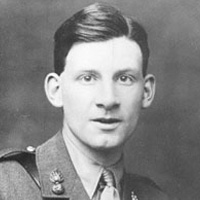Glory of Women by Siegfried Sassoon: Summary and Analysis
Glory of Women by anti-war poet Siegfried Sassoon is in fact the starting of the anti-women literature in the field of English literature. This sonnet is sarcastic in theme and in the structure as the title indicates the praise of the women, but the poem condemns women for making the bloody and destructive war a matter of pride to talk about.

Siegfried L. Sassoon (1886-1967)
In the same manner the poem is in sonnet form, and it is obvious that the sonnet, always has the theme of love and romance, but here the theme is violence of war and the condemnation of women.
In the beginning of the poem, Sassoon glorifies image of the soldiers among British women. They regard the soldier as brave, courageous and chivalrous and appreciates their wounds. They have the positive image or the hero image of the soldier. Women ignore the disgrace of the war appreciating their chivalry. They want to see their male members with the decorations and medals. Moreover, their stories are listened with joys and excitement. Women lament on the death of the soldiers as if the soldiers are the heroes. These events provide the evidence of the popular image of the soldiers during the First World War. The first part has presented the hero-image of the soldier created by the glorious talk of the women who sat at home, untouched by the torturous scene of the battlefield.
But in the sestet, the previous idea of glory is opposed by the use of words like retire, dead, hell, horror, breaks, trampling, terrible corpses, blind with blood, fire etc. Sestet presents the villain image of the solder. The soldiers are not as glorious as the women think to be because they only retire from the war field when they mutually destroy each other. They are the cruelest villains who trample over the corpse of others. Hero image of the first part is replaced by the villain image of the sestet. Octave gives the statement, sestet presents a counter statement. In sestet, the poet informs women of what they had never understood of: that war itself is not about honor and glory; pain, loss, and death are the ultimate result of war.
The poem is not against Germany, but against a mechanism called war. In the concluding section of the poem, the speaker brings a reference of the German mother who might be knitting the socks by the moment her son is dying in the field of the war. Through this reference, the poet is not going against Germany, but just exposing the horrors of war. Mother’s son has been playing the game of killing and being killed and this time he could not win others. This shows that her son is not playing any heroic game, but the bloody game of mutual destruction. The title of the poem is ironical what women think to be a dignity that is in fact an act of disgrace. The soldiers are not famous, but infamous. The use of irony in this poem exposes the gap between what the women think of the soldiers and what the soldiers actually are. The irony is in the title what they think to be a glory is in fact an illusion.
This poem is written in the Italian sonnet form with rhyming patterns of ABABCDCD EFGEFG. Some alliterative lines in the poem are: "heroes, home" and "blind with blood". The use of imagery in the poem such as ‘trampling the terrible corpses - blind with blood’ and ‘his face is trodden deeper into the mud’ intensify the horrific scene of war field. Through these imageries the poet is trying to depict a clearer mental picture and proves how actually destructive and brutal the war is.
